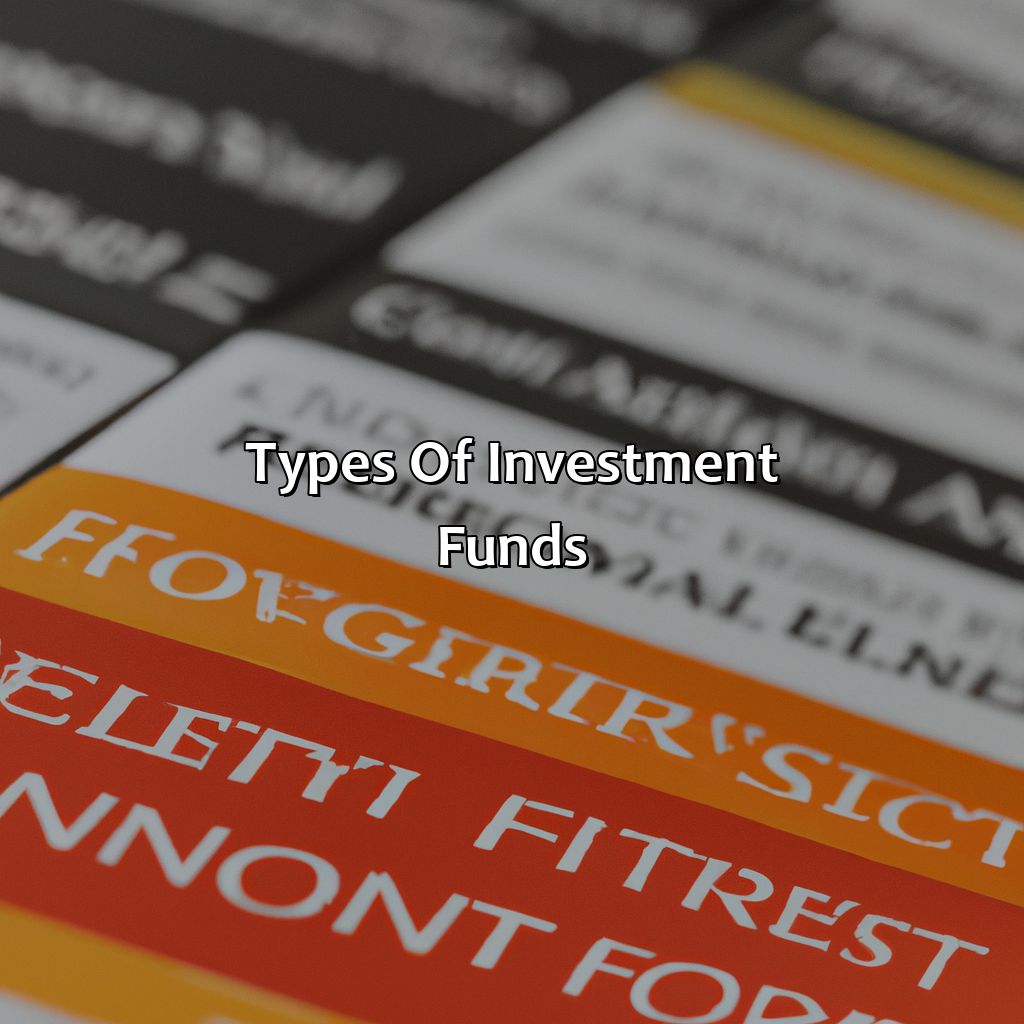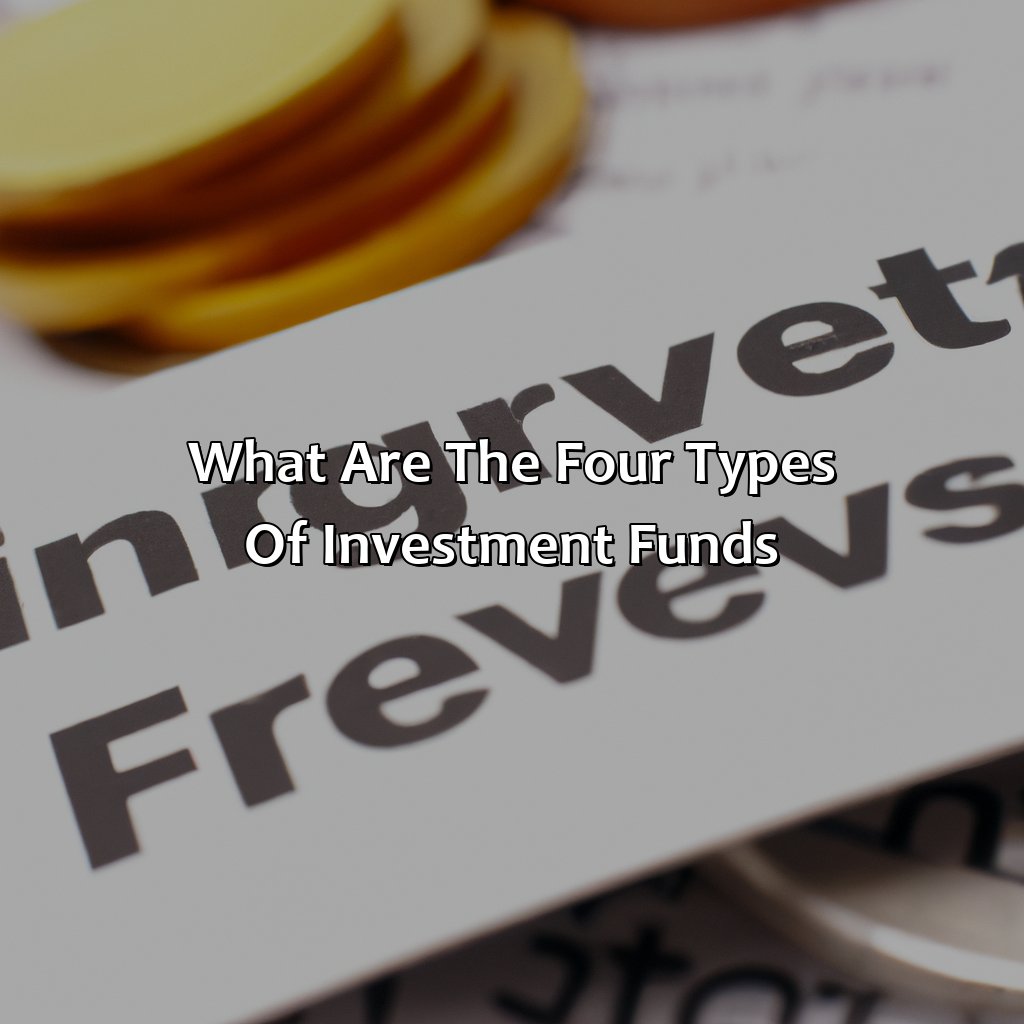What Are The Four Types Of Investment Funds?
Key Takeaway:
- Mutual funds are a popular type of investment fund that pools money from multiple investors to purchase diversified portfolios of stocks, bonds, or other securities.
- Exchange Traded Funds (ETFs) are similar to mutual funds, but they are traded on stock exchanges like individual stocks, and their prices fluctuate throughout the day.
- Hedge funds are private investment funds that use various strategies to generate high returns, often through riskier investments than mutual funds or ETFs.
Are you confused about the different types of investment funds? This article will help you understand the four main types and help you take charge of your financial future. With the right knowledge, you can make an informed decision when investing.
Types of Investment Funds
Know the characteristics of each type of investment fund to see which fits your investment goals. Discover the unique features of Mutual Funds, Exchange Traded Funds (ETFs), Hedge Funds, and Private Equity Funds. This knowledge can help you create a successful investment portfolio.

Image credits: retiregenz.com by Joel Duncun
Mutual Funds
Investment Pools, also known as Mutual Funds, are funds that pool money from multiple investors and invest in a diversified portfolio of securities. Here are three crucial points about them:
- Professional Portfolio Management: Mutual funds invest in stocks, bonds or other securities managed by professional portfolio managers who decide which assets to buy and sell.
- Diversification: Investment in a variety of assets lowers the risk of loss if one security or industry doesn’t perform well.
- Liquidity: Mutual fund units can be bought or sold whenever the market is open at prevailing prices without impacting underlying security prices.
Mutual funds allow retail investors to own a diversified investment portfolio with small investments enabling ordinary individuals to directly participate in capital markets. A piece of advice for potential investors- Understand the fund’s objectives, past record, investment style and cost structure before investing.
ETFs: Because sometimes you just want to invest in a product that sounds like a fancy car model.
Exchange Traded Funds (ETFs)
One of the major types of passive investment funds is a tradable asset called Exchange Traded Funds (ETFs). Unlike mutual funds, ETFs are traded on stock exchanges just like individual stocks. Investors can purchase or sell ETF shares throughout the trading day at market prices, with each share representing ownership in the underlying assets held by the fund. Due to their lower management fees and tax-efficient structure, ETFs have become popular investment vehicles for both retail and institutional investors.
When investing in ETFs, it is essential to note that they come in different varieties based on their investment goals and asset classes. Some ETFs track a particular index, while others focus on specific sectors or geographical regions. Additionally, some ETFs aim for income generation through stock dividends or bond interest payments.
It’s vital to weigh up costs and trading fees from your broker before investing because these small expenses can significantly impact long-term performance. Be mindful of any commission charges as well as annual operating expenses.
If you don’t want to miss out on potential market returns while still mitigating risk, diversifying your portfolio with a mix of low-cost index-tracking ETFs should be considered. By monitoring these investments closely and maintaining your positions for an extended period, you could increase your chances of achieving financial security over time.
Be warned, investing in hedge funds is like playing poker with a sharp-toothed octopus – it may be thrilling, but you’re likely to lose a limb.
Hedge Funds
Investment strategies utilizing advanced techniques to generate profit are coined as Diverse Investment Strategies. Hedge funds, an instance of this strand of investment, are designed to yield gains regardless of market conditions by borrowing capital for trading shares, commodities, and derivatives.
Why settle for controlling just your own money when you can control other people’s too? Welcome to the thrilling world of private equity funds.
Private Equity Funds
Investment in private businesses can be made through a type of investment vehicle known as non-public equity funds. These funds are utilized by wealthy individuals, institutional investors and firms to invest in private companies that require capital for growth or restructuring. Such investments are generally made with the expectation of high returns but also come with a higher risk profile and longer holding periods.
Private equity firms usually employ professional managers who work to identify suitable investments, conduct thorough due diligence and manage the portfolio companies over an extended period. They use different financial instruments such as leveraged buyouts, growth capital and venture capital to make profits for their investors.
Regardless of the risks posed regarding investing in private companies, non-public equity funds are considered to be highly profitable due to the nature of these assets. The significant returns that they provide have given birth to many successful businesses across industries.
According to a report published by Preqin, non-public equity fundraising surpasses expectations in Q1 2021, recording more than $180bn – a four-year high.
Five Facts About the Four Types of Investment Funds:
The four types of investment funds are mutual funds, exchange-traded funds (ETFs), index funds, and hedge funds. (Source: Investopedia)
Mutual funds are professionally managed portfolios of stocks, bonds, and other securities that are owned by a group of investors. (Source: The Balance)
ETFs are similar to mutual funds, but they are traded like individual stocks on stock exchanges. (Source: Vanguard)
Index funds track the performance of a specific market index, such as the S&P 500, and have lower fees compared to actively managed funds. (Source: Fidelity)
Hedge funds are private investment funds that use complex strategies and have high minimum investment requirements and fees. (Source: The Street)
FAQs about What Are The Four Types Of Investment Funds?
What are the four types of investment funds?
The four types of investment funds are: money market funds, bond funds, stock funds, and target-date funds.
What is a money market fund?
A money market fund invests in short-term, low-risk securities such as government debt, certificates of deposit, and commercial paper. It aims to provide a stable value and typically pays dividends based on short-term interest rates.
What is a bond fund?
A bond fund invests in a variety of fixed-income securities, such as corporate bonds, municipal bonds, and Treasury bonds. Bond funds are less risky than stock funds and aim to provide income through coupon payments and potential capital appreciation.
What is a stock fund?
A stock fund invests in a variety of equities, such as shares of common stock, preferred stock, and international stock. Stock funds aim to provide capital appreciation over the long term through growth in the value of underlying stocks.
What is a target-date fund?
A target-date fund invests in a mix of asset classes, such as stocks, bonds, and cash, with a specific target retirement date in mind. Over time, the allocation of investments becomes more conservative as the target date approaches.
What is a mutual fund?
A mutual fund is a type of investment fund that pools money from many investors to purchase a diversified portfolio of stocks, bonds, or other securities. Investors buy shares in the mutual fund and bear a portion of the fund’s gains or losses.
 Checkout this IRS Loophole
Checkout this IRS Loophole 
